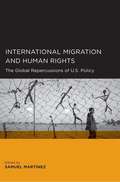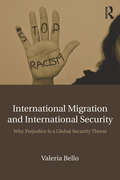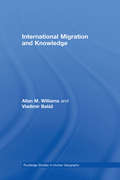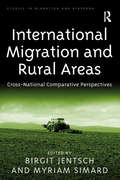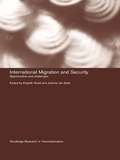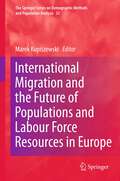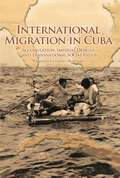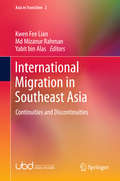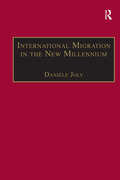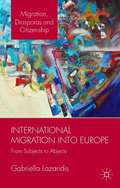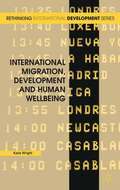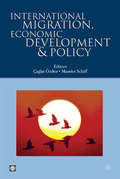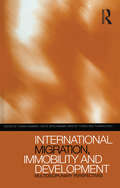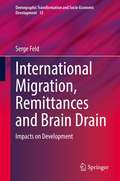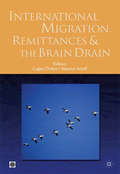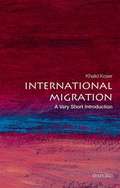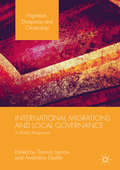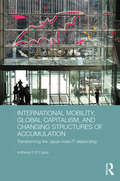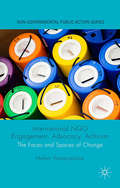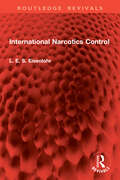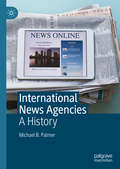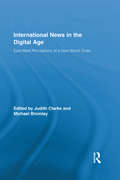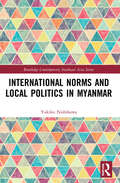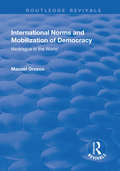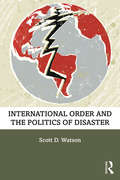- Table View
- List View
International Migration and Human Rights: The Global Repercussions of U.S. Policy
by Samuel MartínezThis book contains essays divided into four sections, each section developing a different angle on the repercussions of U.S. policy for the rights of migrants at different points in history and in various parts of the world.
International Migration and International Security: Why Prejudice Is a Global Security Threat
by Valeria BelloThrough an interdisciplinary analytic lens that combines debates emerged in the fields of international relations, political science and sociology, Valeria Bello reveals how transnational dynamics have increased extremism, prejudiced attitudes towards others and international xenophobia. Bello begins her analysis by tracing similarities between Europe today and Europe before World War II to explain why prejudice is a global security threat and why it is arising as a current global concern within International Organizations. In such a light, Bello shows how changes in the International System and the attack on the UN practice of Intercultural Dialogue have become sources of new perceived threats and the reasons for which new exclusionary patterns have arisen. She argues that both those outcomes have been exacerbating the perceived clash of civilizations and the root causes of different fashions of extremisms. Bello concludes by portraying alternative ways to deal with these instabilities through a partnership of the different stakeholders involved, including both state and non-state actors at global, regional, national and local levels. International Migration and International Security provides a unique crosscutting angle from which to analyze the current socio-political crisis connected to the theme of international migration that the world is currently witnessing. Bello expertly shows that different paths for the world are possible and suggest ways to further promote Global Human Security through local, national, regional and global practices of Intercultural Dialogue.
International Migration and Knowledge (Routledge Studies in Human Geography)
by Allan Williams Vladimir BalážTwo unconnected but important recent academic and policy debates have focussed on the idea of the knowledge-based economy and the economic consequences of increasing international migration. This book challenges pre-conceived views on the debates and argues the need to understand that all migrants are potentially knowledge carriers and learners, and that they play an essential role in the globalization of knowledge transactions. Deconstructing the concept of knowledge, and demonstrating how tacit knowledge is in fact an amalgam of encultured and embrained/embodied forms of knowledge this book considers how international migration has profound consequences, analysed, first, in terms of the economic and immigration strategies of national and regional bodies. And, secondly, the authors explore how the ‘diversity dividend’ of migration is captured by firms through their management strategies, and by individuals through increasingly boundaryless careers, continuous learning and transnational working lives. This research is a highly original contribution which provides the first overview of one of the most dynamic forces for change in the globalising economy. It will challenge migration researchers and students to engage with the management and learning literatures, and it will challenge management and economic policy analysts to think through the role of international migration. As such it will contribute to teaching and research in a range of social science disciplines, as well as to those involved in policy arenas ensuring that firms and all migrants engage in mutual learning and knowledge sharing.
International Migration and Rural Areas: Cross-National Comparative Perspectives (Studies in Migration and Diaspora)
by Myriam SimardWhile immigrants are still predominantly choosing urban areas to locate to, there is now increasing evidence of immigration to rural areas which poses its own challenges for those relocating, from the scarcity of high quality jobs to the provision of public and private services. Addressing the shortcomings in current research, this book employs an innovative approach by exploring this relationship from a cross-national, comparative, global perspective. It draws lessons from case studies across a range of geographical and political contexts, including Canada, the USA, Ireland, Scotland, Greece and Russia. Bringing together migration experts from a range of academic disciplines, International Migration and Rural Areas contributes to conceptual developments and also identifies policy concerns which can be pursued at national, sub-national and supra-national levels. As such, it will appeal to policy makers, as well as scholars across a range of disciplines, including geography, politics, demography, social policy, sociology and anthropology.
International Migration and Security: Opportunities and Challenges (Routledge Research in Transnationalism)
by Elspeth Guild Joanne Van SelmEvery day newspapers in the Western world carry articles about illegal immigrants, asylum seekers and other migrants. The focus of these articles varies greatly from migrants as a threat to one or another important social or societal interest, to migrants as an important asset to those same interests. The tone is most often emotional - whichever way the focus goes. The overall impact is to confuse: is migration good or bad? In this book Guild and van Selm seek to investigate these value assessments regarding migrants in Europe, the USA, Canada and Australia. While looking at issues such as security, human rights, legal systems, identity, racism, welfare, health and labour, the authors also respond to critics of immigration.
International Migration and the Future of Populations and Labour in Europe
by Marek KupiszewskiThe changes of populations are determined by fertility, mortality and migration. On the national level, international migration is a factor of increasing demographic, economic, social and political importance. This book addresses the debate on the impact of international migration and economic activity on population and labour force resources in future. It presents a study conducted for 27 European countries, looking 50 years ahead (2002-2052). An extended discussion of theories and factors underlying the assumed evolution of the components of change and economic activity is included as well as a detailed analysis of the historical trends. These theoretical and empirical considerations lead to defining scenarios of future mortality, fertility, economic activity and international migration, which have been fed into a projection model, producing various future population dynamics and labour force trajectories. In addition, simulations have been made to estimate the size of replacement migration needed to maintain selected demographic and labour market parameters in the countries of Europe. The results presented in this book allow researchers, governments and policy makers to evaluate to what extent various migration and labour market policies may be instrumental in achieving the desired population and labour size and structures. The secondary purpose of this volume is to reveal the methodology and argumentation lying behind a complex population forecasting and simulation exercise, which is not done frequently, but is critical for the assessment of the forecasts and also valuable from a purely didactic point of view.
International Migration in Cuba: Accumulation, Imperial Designs, and Transnational Social Fields
by Alejandro Portes Margarita Cervantes-RodríguezSince the arrival of the Spanish conquerors at the beginning of the colonial period, Cuba has been hugely influenced by international migration. Between 1791 and 1810, for instance, many French people migrated to Cuba in the wake of the purchase of Louisiana by the United States and turmoil in Saint-Domingue. Between 1847 and 1874, Cuba was the main recipient of Chinese indentured laborers in Latin America. During the nineteenth century as a whole, more Spanish people migrated to Cuba than anywhere else in the Americas, and hundreds of thousands of slaves were taken to the island. The first decades of the twentieth century saw large numbers of immigrants and temporary workers from various societies arrive in Cuba. And since the revolution of 1959, a continuous outflow of Cubans toward many countries has taken place—with lasting consequences.In this book, the most comprehensive study of international migration in Cuba ever undertaken, Margarita Cervantes-Rodríguez aims to elucidate the forces that have shaped international migration and the involvement of the migrants in transnational social fields since the beginning of the colonial period. Drawing on Fernand Braudel’s concept of longue durée, transnational studies, perspectives on power, and other theoretical frameworks, the author places her analysis in a much wider historical and theoretical perspective than has previously been applied to the study of international migration in Cuba, making this a work of substantial interest to social scientists as well as historians.
International Migration in Southeast Asia
by Kwen Fee Lian Md Mizanur Rahman Yabit Bin AlasThis book is a collection of work by migration scholars and researchers who are actively conducting fieldwork in Southeast Asia. It presents a wide variety of current research and approaches the field of international labor migration from a regional perspective, acknowledging that the migration process goes beyond local and national boundaries and is embedded in regional and global interconnections. The chapters capture the complexity and richness of the migration phenomenon and experience, which manifests itself in a multitude of ways in a region well known for its diversity. The collection highlights the continuities and discontinuities in the linkages that have been forged through the movement of people between sending and receiving societies. Such linkages are explained by distinguishing between migration that has been sustained by a colonial past and migration that has been precipitated by globalization in the last two decades. The diversity of issues in the region covered by this volume will encourage a rethink of some of the conventional views of migration scholarship and result in a more critical reflection of how we approach migration research.
International Migration in the New Millennium: Global Movement and Settlement (Research in Migration and Ethnic Relations Series)
by Danièle JolyInternational migration is an issue of enduring interest and debate, as strong as ever in the 21st century. This in-depth, global examination proposes a balance sheet of international migration and highlights its consequences regarding migrant populations at the turn of the century. It draws together theoretical studies supported by empirical examples, and derives from quantitative as well as qualitative research. Assessing the major existing models within the theory of international migration, the contributors continue to examine a variety of key themes, including: increased flows of female migration; the meaning and relationship between identity, ethnicity and diaspora; return migration and the complex problem of reintegration. The volume also establishes a typology of refugees and examines the different domains of ethnicity and racism. A valuable volume for all those interested in migration, population settlement and transnational communities, it addresses all the major issues of international migration in the new millennium.
International Migration into Europe
by Gabriella LazaridisMigratory pressure is growing and with it the challenge to address the integration of migrants into the social fabric of the EU in a coherent and comprehensive manner. Migrants are subject to different forms and degrees of marginalization in the inclusion-exclusion continuum, which in turn leads to exposure to different forms and degrees of risk and vulnerability. The transcultural subject finds himself/herself excluded from the host society. In this respect migrants are transformed from being legal subjects as they turn into legal abjects. The process of abjectification is not linear, and differs according to one's differential inclusion and/or exclusion in the host country. Gabriella Lazaridis aims to decipher the complex web of structural, institutional and cultural contradictions which shape the inclusion-exclusion dialectic and the multifaceted grid within which the 'us' becomes the 'other' and the 'other' becomes the 'us' within the transformation of the European space intoa transnational one in the wider globalization process.
International Migration, Development and Human Wellbeing
by Katie WrightKatie Wright explores how human wellbeing is constructed and how it 'travels' across spatial boundaries. She draws on empirical research, undertaken with Peruvian migrants based in London and Madrid and their Peru-based relatives and close friends to explore how human wellbeing is constructed and how it 'travels' transnationally.
International Migration, Economic Development & Policy
by Maurice Schiff Çaglar ÖzdenInternational migration has become a central element of international relations and global integration due to its rapidly increasing economic, social, and cultural impact in both source and destination countries. This book provides new evidence on the impact of migration and remittances on several development indicators, including innovative thinking about the nexus between migration and birth rates. In addition, the book identifies the effect of host country policies on migration flows, examines the determinants of return and repeat migration, and explores the degree of success of return migrants upon return to their country of origin.
International Migration, Immobility and Development: Multidisciplinary Perspectives
by Tomas HammarThe study of international migration and ethnic relations is rapidly expanding in the social sciences, in the humanities, and in law and medicine at universities around the world. Theories and methods are borrowed from many disciplines, but with little cross-fertilization, thereby leaving many core issues out. This authoritative book fills a gap by providing an expertly integrated overview of international migration from a wide range of disciplinary perspectives. Throughout the book, South to North migration is used as the main example.The authors, leading experts in their fields, ask provocative new questions such as the counterfactual, `Why do people not migrate?' and address old questions in fresh ways in a language accessible for students in a range of disciplines. Does migration from less developed countries stimulate or obstruct development? Does development reduce or increase the flows of migration? What are the dynamics of a migration process? Geography, economics, political science, social anthropology and sociology all inform this book, which is certain to become an established text in migration studies.
International Migration, Remittances and Brain Drain: Impacts on Development (Demographic Transformation and Socio-Economic Development #13)
by Serge FeldThis book provides an analysis of theoretical and empirical researches on the effects of remittances and brain drain on the development of less developed countries (LDCs). It analyzes the most recent global, regional and national data as well as the arguments for and against the emigration of highly skilled personnel and remittances, thereby highlighting policies aimed at optimizing the link between migration and development. The book examines in depth the arguments against "brain drain", namely the loss of skilled labor, wasted public investment in higher education, and reduced tax revenues. It also presents the arguments in favor, emphasizing on the transfer of scientific knowledge, the incentive effect of increased education spending, and participation in international networks. It addresses the central issue of emigration of medical personnel from developing countries and its consequences on the population.The book focuses on the effects of remittances on poverty and inequalities. They improve health conditions, raise education levels and empower women. Positive effects include the stabilizing function of remittances and the improvement of external accounts. Other effects are subject to conflicting assessments such as the reduction of labor supply and the "Dutch disease". The focus is on institutions who integrate economic, social and political incentives in order to establish remittances at the heart of development policies.The book provides a reference for students and research centers devoted to development economics, centers for international migration studies, and research units focusing on population, migration, and development.
International Migration, Remittances, and the Brain Drain
by Maurice Schiff Çaglar ÖzdenInternational migration, the movement of people across international boundaries, has enormous economic, social and cultural implications in both origin and destination countries. Using original research, this title examines the determinants of migration, the impact of remittances and migration on poverty, welfare, and investment decisions, and the consequences of brain drain, brain gain, and brain waste.
International Migration: A Very Short Introduction
by Khalid KoserInternational migration is an issue of intense public and political concern. How closely linked are migrants with terrorist organizations? What factors lie behind the dramatic increase in the number of woman migrating? This Very Short Introduction looks at the global phenomenon of human migration--both legal and illegal--revealing how migration actually presents opportunities that must be taken advantage of in light of the current economic climate. The author debunks myths such as the claim that migrants take jobs away from local workers, or that they take advantage of health care systems. He reveals why society as we now know it could not function without them. Using interviews with migrants from around the world, the author presents the human side of topics such as asylum and refugees, human trafficking, migrant smuggling, development, and the international labor force. His goal throughout is to allow readers to see beyond the negative spin usually given the subject by the media and politicians, and come to their own conclusions on the current international migration situation. It is a valuable reference for students of economics, politics, geography, or sociology, and for anyone interested in taking a deeper look at media coverage of immigration and its effects.
International Migrations and Local Governance
by Thomas Lacroix Amandine DesilleThis volume provides a comprehensive overview of the role of local governments around the world in the management of the migration, integration and development nexus. Drawing on case studies from the Global North and South, this comparative work fills a lacuna in the existing literature which has focused largely on migration as addressed by European and North American cities. Further, it widens the current debate by confronting northern experiences with attitudes and strategies observed in sending countries; clearly demonstrating that international mobility has become a global issue for cities at both end of the migration spectrum. This innovative work will provide a valuable resource for students and scholars working in the social sciences, public policy and development; in addition to practitioners and policymakers.
International Mobility, Global Capitalism, and Changing Structures of Accumulation: Transforming the Japan-India IT Relationship (Routledge Advances in International Political Economy)
by Anthony P. D'CostaInternational mobility is not a new concept as people have moved throughout history, voluntarily and forcibly, for personal, familial, economic, political, and professional reasons. Yet, the mobility of technical talent in the global economy is relatively new, largely voluntary, structurally determined by market forces, and influenced by immigration policies. With over a decade's worth of extensive research in India, Japan, Finland, and Singapore, this book provides an alternative understanding of how capitalism functions at the global level by specifically analyzing the international movement of technical professionals between India and Japan. There are three factors that inform this study: the services transition away from manufacturing, the movement of technical professionals in the world economy, and the demographic crisis facing Japan. The dynamics of changing capitalism are examined by theorizing the emergence of the services sector in the USA and Japan, analyzing the pronounced social inequality in India that is the basis for the global supply of highly skilled technical professionals, and providing considerable empirical data on the flows of professionals to these two countries to indicate Japan's institutional inflexibility in accommodating foreign talent. The author anticipates that Japanese industry will shed some of its institutional rigidity due to the pressures of competition and the scarcity of technical professionals. Providing a wealth of information on the topic of international mobility, this book is an essential addition for scholars and students in the field of International Development, Business Studies, Asian Studies, Migration Studies, and Political Economy.
International NGO Engagement, Advocacy, Activism: The Faces and Spaces of Change (Non-Governmental Public Action)
by Helen YanacopulosThe world of international non-governmental organisations (INGOs) has dramatically changed during the last two decades. The author critically analyses the engagement of INGOs within the contemporary international development landscape, enabling readers to further understand INGOs involvement in the politics of social change.
International Narcotics Control (Routledge Revivals)
by L. E. EisenlohrFirst published in 1934, International Narcotics Control is concerned with dangerous drugs solely as a subject of international administration. The ultimate questions that this study seeks to answer bear upon the form and function of the international organisms which have been set up to deal with drug traffic. What relation shall the function of a body bear to the method of its appointment, to its composition, and to source of its responsibility? What type of organism will secure the best response from national administrations? What should be the method of contact between national and international bodies? The answers to questions such as these can be found in this study.Divided into two parts, the book discusses important themes like the establishment and the work of the Opium Advisory Committee, the origin and functioning of the Permanent Central Opium Board; and the control of raw opium production in India, former Yugoslavia, Turkey, and Persia. This is an important historical reference work for scholars and students of criminology.
International News Agencies: A History
by Michael B. PalmerInternational news-agencies, such as Reuters, the Associated Press and Agence France-Presse, have long been ‘unsung heroes’ of the media sphere. From the mid-nineteenth century, in Britain, the US, France and, to a lesser extent, Germany, a small number of agencies have fed their respective countries with international news reports. They informed governments, businesses, media and, indirectly, the general public. They helped define ‘news’. Drawing on years of archival research and first-hand experience of major news agencies, this book provides a comprehensive history of the leading news agencies based in the UK, France and the USA, from the early 1800s to the present day. It retraces their relations with one another, with competitors and clients, and the types of news, information and data they collected, edited and transmitted, via a variety of means, from carrier-pigeons to artificial intelligence. It examines the sometimes colourful biographies of agency newsmen, and the rise and fall of news agencies as markets and methods shifted, concluding by looking to the future of the organisations.
International News in the Digital Age: East-West Perceptions of A New World Order (Routledge Research in Journalism)
by Judith Clarke Michael BromleyThe new research presented in this volume suggests that general perceptions (cultural, psychological, geographical), allied to the customs and values of journalism, and underpinned by the uses of technology, significantly shape international news. This gives rise to a blend of the old and the new; traditions of cultural centredness and innovative practices; anchorages of place and the rootlessness of globalization. Technology per se has not swept all before it. On the other hand, its uses have altered the means and methods of international news sourcing, construction and dissemination. Consequently, the uptake of technology has contributed to fundamental changes in style and form, and has greatly facilitated cross-cultural exchanges. The category ‘international news’ is now more of a hybrid, as recognized by the BBC and others. The chapters in this book demonstrate that this hybridity is unevenly distributed across geo-political domains, and often across time. Nevertheless, as the contributors to this volume show, the concept of ‘international news’ relies on tightly interwoven elements of orthodox journalism, social media, civic expression and public assembly.
International Norms and Local Politics in Myanmar (Routledge Contemporary Southeast Asia Series)
by Yukiko NishikawaNishikawa explores how international norms have been adopted in the local context in Myanmar to project a certain international image, while in fact the authorities are exploiting these norms to protect their own interests. In the liberal international world order promoted since the end of the Cold War, democracy, rule of law and human rights have become key components in state and peace-building around the world. Many donor governments and international organisations have promoted them in their aid and assistance. However, the promotion of these international norms is based on a flawed understanding of sovereignty and the world. For this reason, the enforcement of these international norms in Myanmar not only fails to protect vulnerable people but also, in some instances, exacerbates the situation, thereby generating critical insecurity to the most vulnerable people. A vital resource for scholars of Myanmar’s politics, as well as a valuable case study for International Relations scholars more broadly.
International Norms and Mobilization for Democracy: Nicaragua in the World (Routledge Revivals)
by Manuel OrozcoThis title was first published in 2002: This volume demonstrates that international action for democracy does not solely rest on American democracy promotion strategies, but that it actually depends on a variety of global actors and interactions. It is suitable for policy experts, non-governmental organizations, international aid agencies and courses on international relations theory, comparative politics, and Latin American politics. The book: introduces a theoretical framework about the effect of international norms on democracy promotion; connects the role of international institutions and norms with advocacy movements in shaping the mobilization to promote democracy; analyses the relationship between the international dimension of democracy promotion and democratization; explains the effect of international democracy promotion in the political transition of Nicaragua from 1979 to 2001; and brings into analysis the various modalities of democracy promotion and their effects.
International Order and the Politics of Disaster
by Scott D. WatsonIn this indispensable and comprehensive text, Scott D. Watson critically examines the current understanding of international order that underpins international disaster management and disaster diplomacy. Based on empirical analysis of the three international disaster management regimes - disaster relief, disaster risk reduction, and disaster migration - and case studies of disaster diplomacy in the United States, Egypt and China, Watson argues that international disaster management and disaster diplomacy are not simply efforts to reduce the impact of disasters or to manage bilateral relations but to reinforce key beliefs about the larger international order. Challenging the conventional understandings of disasters as natural, as exogenous shocks, or as unintended and accidental outcomes of the current order, this text shows how the ideological foundations of the current heterogenous international order produce recurrent disasters. International Order and the Politics of Disaster is a vital source for undergraduate or graduate students interested in international responses to disasters and complex humanitarian emergencies, forced migration and displacement, as well as climate change and development.
